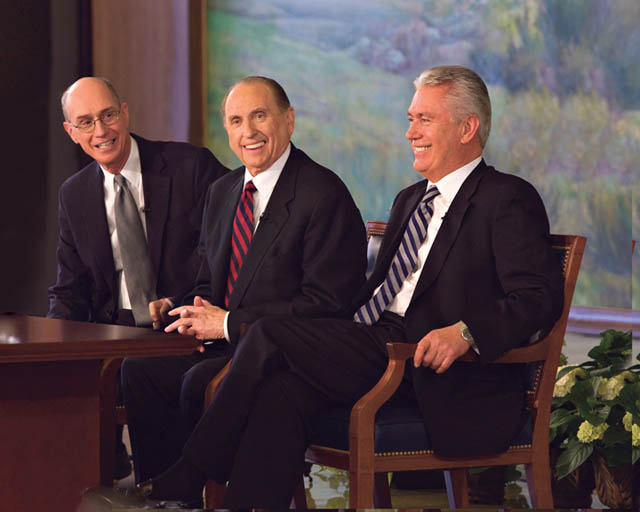This is the third installment in a series of articles on Mormon prophets. The series is based on a talk given by Ezra Taft
Benson, who was then a Mormon apostle. In the article, he outlines Fourteen Fundamentals in Following the Prophet. The second principle is: The living prophet is more vital to us than the Standard Works. The standard works is a Mormon term for scriptures and includes all approved Mormon scriptures: The Old and New Testament of the Bible, The Book of Mormon, The Doctrine and Covenants, and the Pearl of Great Price.
This concept may be controversial or confusing to some people. What did Elder Benson mean by this?
The Bible was written for the people of Biblical times. Mormons believe in the Bible and study it every two out of four years. However, many of the teachings in it were specific to the time. For instance, Noah was told to build an ark. We are not. Moses was taught to take his people into the wilderness. We are not. There were specific problems those generations faced and they needed specific instruction from God to know how to handle them. The same is true today. Today our civilization faces unique challenges not faced by those earlier generations and the Bible does not always address them. In these cases, we must turn to a living prophet who can approach God about our specific challenges. How are we supposed to view the Internet? What about gay marriage? These were not the issues of the Biblical world, but they are the issues of our own world.
We see an example of this in the New Testament. Jesus taught, “Think not that I am come to destroy the law, or the prophets: I am not come to destroy, but to fulfil. For verily I say unto you, Till heaven and earth pass, one jot or one tittle shall in no wise pass from the law, till all be fulfilled” (Matthew 5:17-18, King James Translation). He then went on to show them how he was going to add to the previous laws, bringing the people to the new higher standard of gospel living for which they were ready. He gave several examples, such as the law that forbid adultery. The people had this law, but now, in the new higher standard, they were taught that to even look at a woman in a lustful way was the same as committing adultery. Jesus was the prophet for that time, as well as our Savior, and it was His responsibility to fit the laws to the needs of that time and the readiness of the people.
Some say the Bible is all we need, but of course, the Bible was not written all at once. It was written by a variety of people in different times. Are we supposed to add to what is written? Some use the following scripture to “prove” we are not to have any new revelation: “For I testify unto every man that heareth the words of the prophecy of this book, If any man shall add unto these things, God shall add unto him the plagues that are written in this book:
“And if any man shall take away from the words of the book of this prophecy, God shall take away his part out of the book of life, and out of the holy city, and from the things which are written in this book.” (Rev. 22:18–19.)
There are several problems with trying to make this verse close the door to allowing God to continue to talk to us through His prophets, even before wondering why we think we can forbid God to speak to us at all—or why we’d want to. A careful student of the Bible will note a similar scripture in the Old Testament: Ye shall not add unto the word which I command you, neither shall ye diminish ought from it, that ye may keep the commandments of the Lord your God which I command you” (Deut. 4:2.) Certainly no one is advocating throwing away most of the Old Testament and all the New Testament. Moses did not mean we must never again talk to God. He meant only that we must not change or add to the law without specific instruction from God. It is not up to man to make personal decisions about truth or law or to put it to a vote. The same is true of Paul’s writing in Revelation. It should be noted that the Book of Revelation was not the last book written—Paul himself “added” to the canon after writing this book.
Nowhere does God announce that He has decided not to ever speak to His children again during mortality. He never permanently closed the doors. While some might think He has retreated to a back room somewhere, Mormons know He is actively involved in our lives and communicating with us concerning the intense challenges of the last days.
And so we now return to the balance between the scriptures and the modern prophets. For an explanation of this, we turn to a modern apostle of Jesus Christ, Jeffrey R. Holland:
Continuing revelation does not demean or discredit existing revelation. The Old Testament does not lose its value in our eyes when we are introduced to the New Testament, and the New Testament is only enhanced when we read the Book of Mormon: Another Testament of Jesus Christ. In considering the additional scripture accepted by Latter-day Saints, we might ask: Were those early Christians who for decades had access only to the primitive Gospel of Mark (generally considered the first of the New Testament Gospels to be written)—were they offended to receive the more detailed accounts set forth later by Matthew and Luke, to say nothing of the unprecedented passages and revelatory emphasis offered later yet by John? Surely they must have rejoiced that ever more convincing evidence of the divinity of Christ kept coming. And so do we rejoice.” (Jeffrey R. Holland, “‘My Words … Never Cease’,” Ensign, May 2008, 91–94).
In the same vein, it takes nothing away from the scriptures to allow God to continue to speak to us, something He will do because He loves us. And just as the people of Moses were supposed to give Moses’ teaching of the Ten Commandments precedence over the teachings of Noah, today, we first look to the living prophets in our own time—because Moses was the living prophet of his time—for guidance in today’s situation. It does not mean the scriptures aren’t true, only that they are a portion of God’s words to us—words of a God who loves us as much as He loved the people of the Bible and who therefore will not leave us in a state of confusion in the days leading up to the Second Coming of Jesus Christ.
The late Terrie Lynn Bittner—beloved wife, mother, grandmother, and friend—was the author of two homeschooling books and numerous articles, including several that appeared in Latter-day Saint magazines. She became a member of the Church at the age of 17 and began sharing her faith online in 1992.





